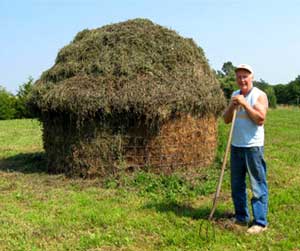From Gene Logsdon
A farmer of deep ecological sensitivity is to the plow jockey on his 200-horsepower tractor what a French chef is to the legions of hamburger handlers at fast food chains. The chef’s work is infused with artistic, scientific, and spiritual satisfactions; the hamburger handler’s is infused only with the ticking of a time clock. To the plow jockey, soil is a boring landscape of clods that need to be crushed. To the ecological farmer, every clod holds a wondrously exotic, tropical-like world of brilliantly colored microorganisms, the very stuff of life.
~
Walk with me over our little farm where biological diversity is our first order of business. On this farm lives a human family along with several families of corn, oats, wheat, orchard trees, grasses, legumes, berries, and garden vegetables, the whole domestic tribe living in a sort of hostile harmony with the wild food chain: animals, insects, and plants in such diversity that I have not been able to name them all. On our little farm, I have identified 130 species of birds, 40 species of wild animals (not counting coonhunters), over 50 species of wildflowers, at least 45 tree species, a myriad of gorgeous butterflies, moths, spiders, beetles, etc., and about 593,455,780 weeds.
~
I believe that the more diversity of species on a farm the more the various forms of life keep each other from achieving out-of-balance population relative to the other species. This increasing diversity means more than merely “balance,” which is a negative accomplishment. Increasing diversity means to me increasing biological dynamism which leads to an increasing amount of total food produced without increasing the amount of human labor or purchased agricultural supplies. The most obvious example is growing clover. Clover works with rhizobia bacteria in the soil to draw nitrogen from the air and make it available to itself and other subsequent plants without any effort or cost to me. A factory to extract nitrogen from the air costs millions of dollars and society’s tendency is then to use the nitrate so produced to make gunpowder, not to enrich the soil…
As all these life forms interact with each other, they create effects that individually they are incapable of. For example, cow flaps draw earthworms to dine on the organic matter. Young trees that have crept into the meadow over the years from the adjoining woodlot draw the cows to their shade. The cow-manure-earthworm-tree environment draws woodcocks to the farm. These birds come for the earthworms under the cow flaps and under the moist dirt bared by tree shade and cow hooves. Not incidentally, the combination has also produced on occasion a fairy ring of edible mushrooms. And also not incidentally, the animal manure is all the while being broken down and returned to enrich the earth. All we have to do is stand and watch in awe and pick the mushrooms.
~~




You must be logged in to post a comment.